2013年高考语法复习——倒装
图片预览
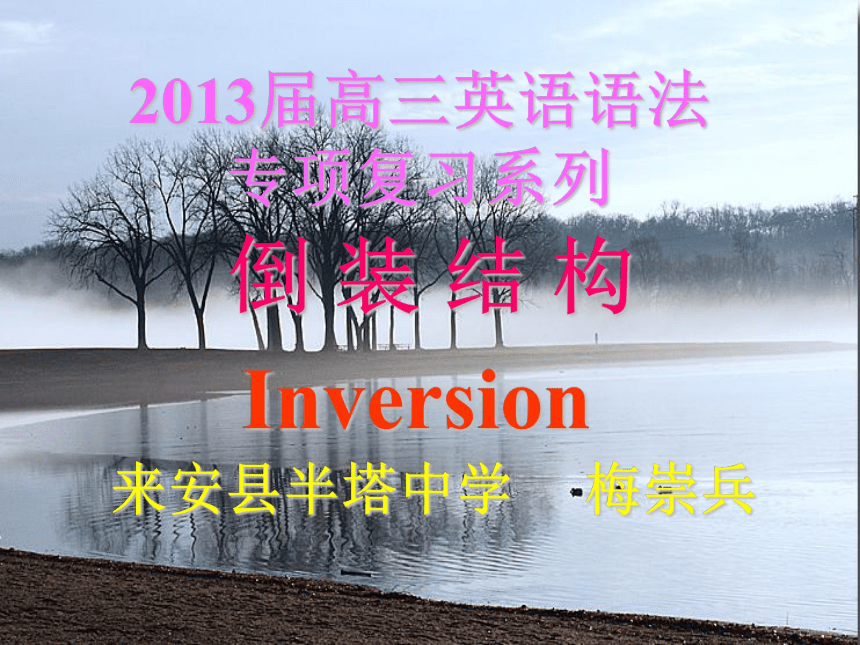
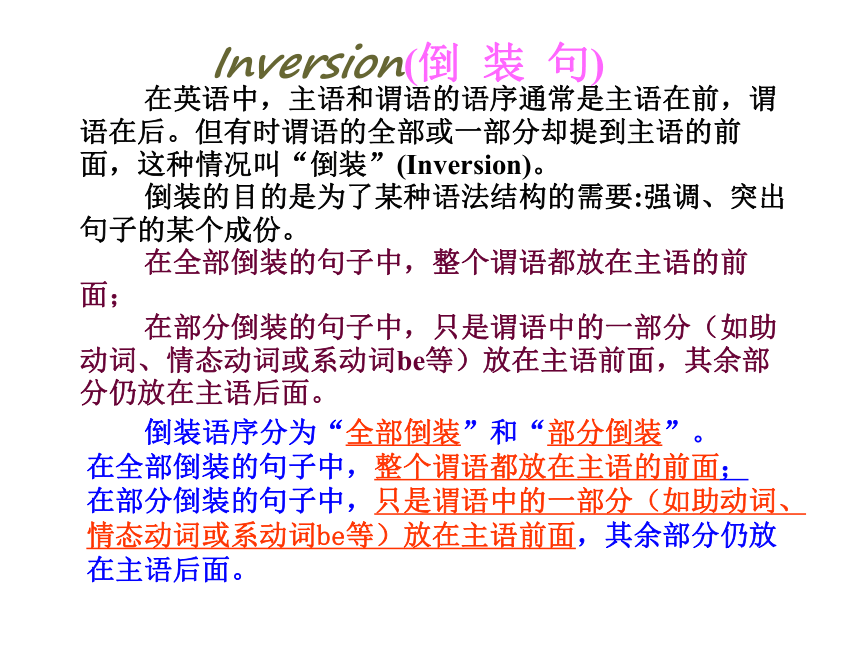
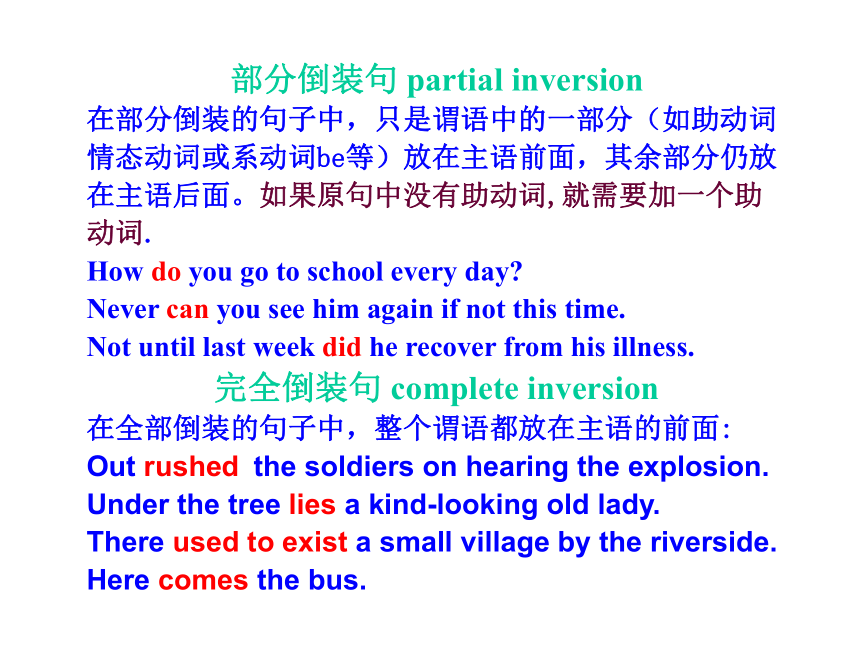
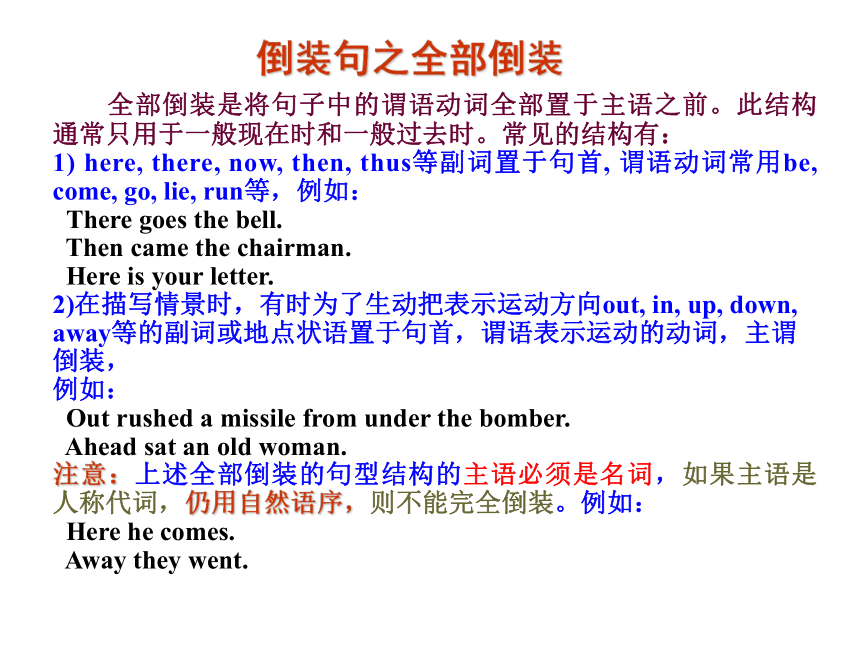
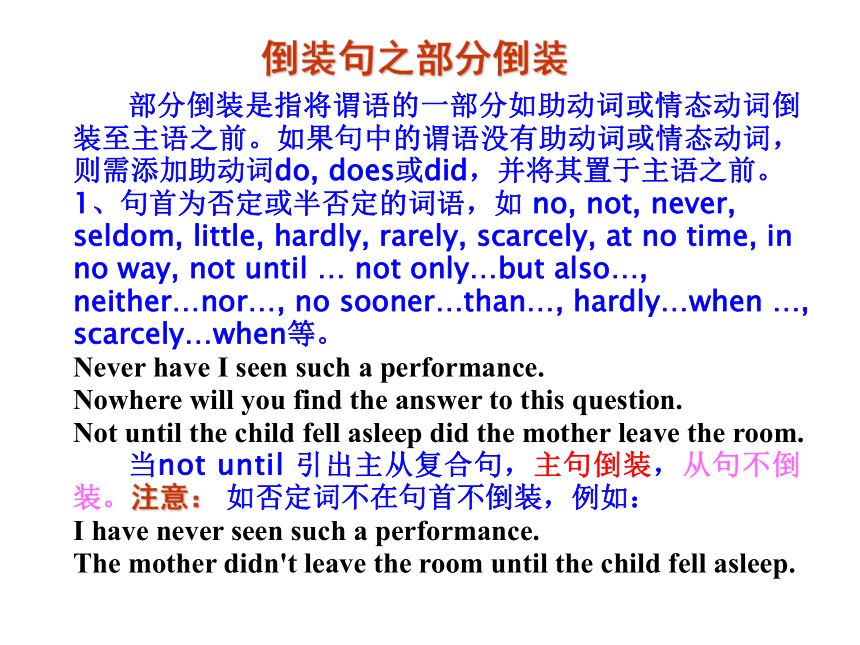
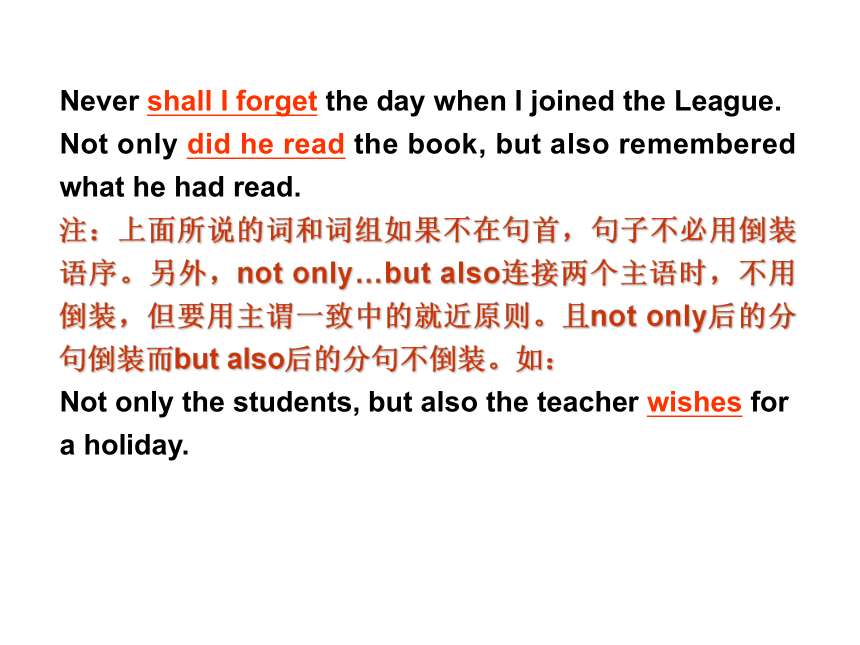
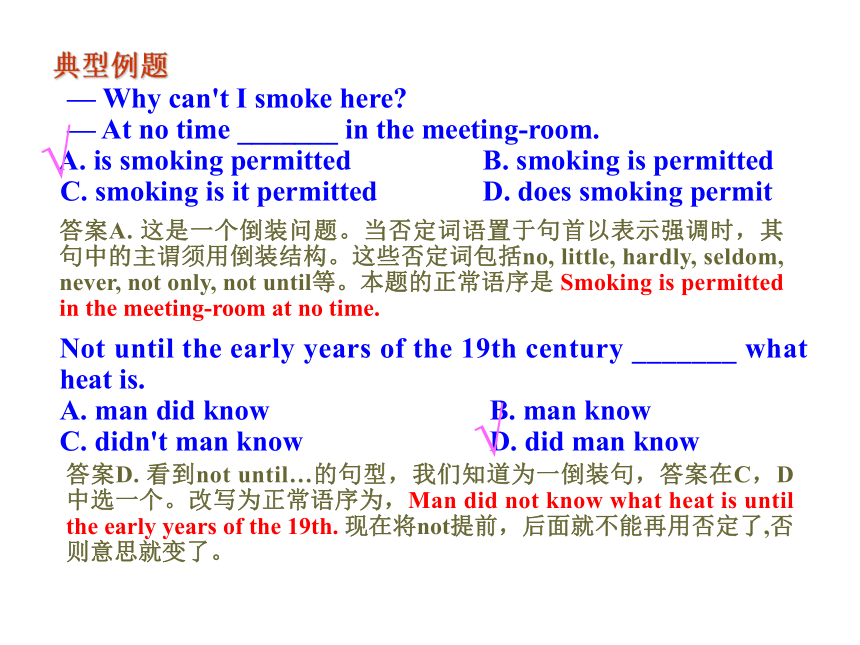
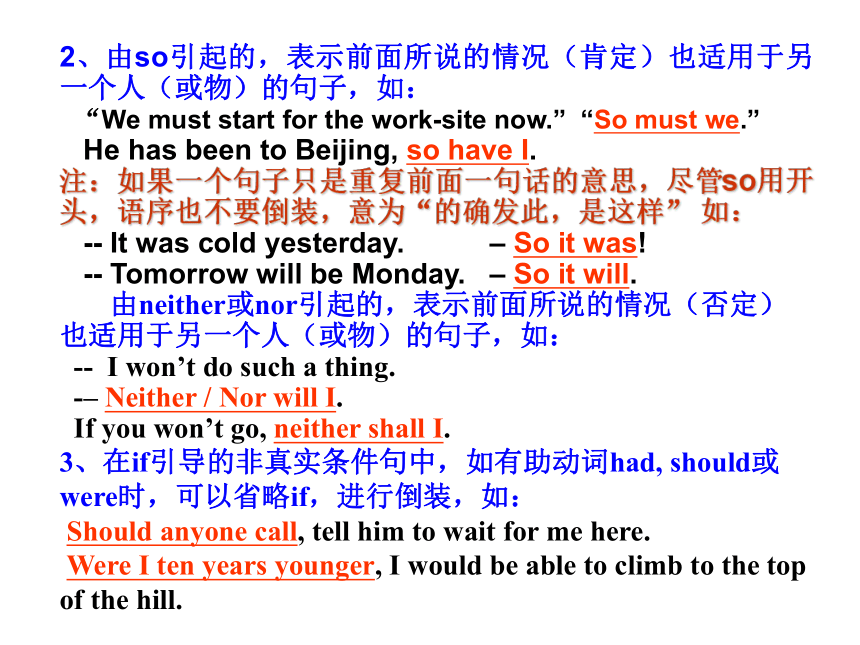
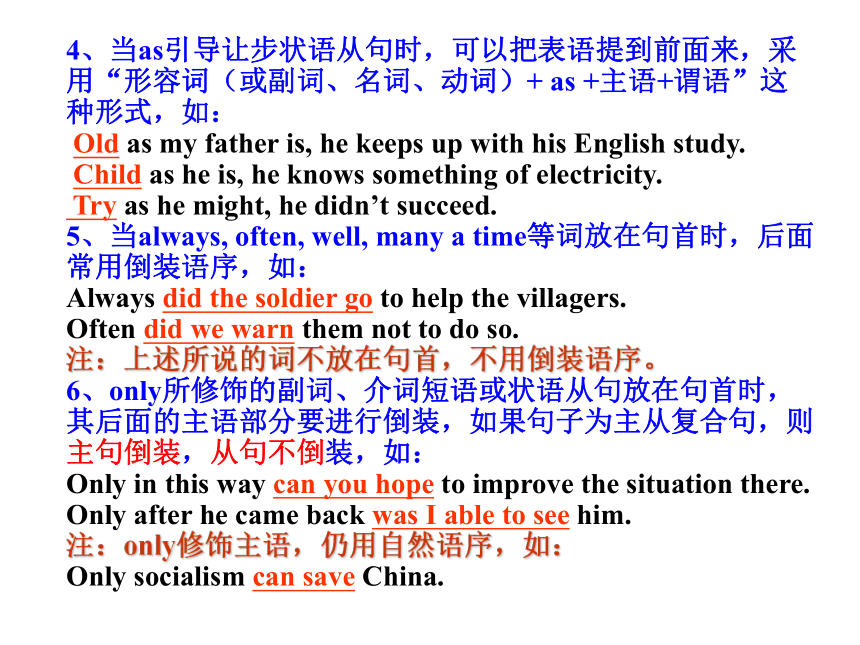
文档简介
(共23张PPT)
2013届高三英语语法专项复习系列
倒 装 结 构
来安县半塔中学 梅崇兵
Inversion
倒装语序分为“全部倒装”和“部分倒装”。
在全部倒装的句子中,整个谓语都放在主语的前面;
在部分倒装的句子中,只是谓语中的一部分(如助动词、情态动词或系动词be等)放在主语前面,其余部分仍放在主语后面。
在英语中,主语和谓语的语序通常是主语在前,谓
语在后。但有时谓语的全部或一部分却提到主语的前
面,这种情况叫“倒装”(Inversion)。
倒装的目的是为了某种语法结构的需要:强调、突出
句子的某个成份。
在全部倒装的句子中,整个谓语都放在主语的前
面;
在部分倒装的句子中,只是谓语中的一部分(如助
动词、情态动词或系动词be等)放在主语前面,其余部
分仍放在主语后面。
Inversion(倒 装 句)
部分倒装句 partial inversion
在部分倒装的句子中,只是谓语中的一部分(如助动词
情态动词或系动词be等)放在主语前面,其余部分仍放
在主语后面。如果原句中没有助动词,就需要加一个助
动词.
How do you go to school every day
Never can you see him again if not this time.
Not until last week did he recover from his illness.
完全倒装句 complete inversion
在全部倒装的句子中,整个谓语都放在主语的前面:
Out rushed the soldiers on hearing the explosion.
Under the tree lies a kind-looking old lady.
There used to exist a small village by the riverside.
Here comes the bus.
倒装句之全部倒装
全部倒装是将句子中的谓语动词全部置于主语之前。此结构通常只用于一般现在时和一般过去时。常见的结构有:
1) here, there, now, then, thus等副词置于句首, 谓语动词常用be, come, go, lie, run等,例如:
There goes the bell.
Then came the chairman.
Here is your letter.
2)在描写情景时,有时为了生动把表示运动方向out, in, up, down, away等的副词或地点状语置于句首,谓语表示运动的动词,主谓倒装,
例如:
Out rushed a missile from under the bomber.
Ahead sat an old woman.
注意:上述全部倒装的句型结构的主语必须是名词,如果主语是人称代词,仍用自然语序,则不能完全倒装。例如:
Here he comes.
Away they went.
倒装句之部分倒装
部分倒装是指将谓语的一部分如助动词或情态动词倒装至主语之前。如果句中的谓语没有助动词或情态动词,则需添加助动词do, does或did,并将其置于主语之前。
1、句首为否定或半否定的词语,如 no, not, never, seldom, little, hardly, rarely, scarcely, at no time, in no way, not until … not only…but also…, neither…nor…, no sooner…than…, hardly…when …, scarcely…when等。
Never have I seen such a performance.
Nowhere will you find the answer to this question.
Not until the child fell asleep did the mother leave the room.
当not until 引出主从复合句,主句倒装,从句不倒装。注意: 如否定词不在句首不倒装,例如:
I have never seen such a performance.
The mother didn't leave the room until the child fell asleep.
Never shall I forget the day when I joined the League.
Not only did he read the book, but also remembered what he had read.
注:上面所说的词和词组如果不在句首,句子不必用倒装语序。另外,not only…but also连接两个主语时,不用倒装,但要用主谓一致中的就近原则。且not only后的分句倒装而but also后的分句不倒装。如:
Not only the students, but also the teacher wishes for a holiday.
典型例题
— Why can't I smoke here
— At no time _______ in the meeting-room.
A. is smoking permitted B. smoking is permitted
C. smoking is it permitted D. does smoking permit
答案A. 这是一个倒装问题。当否定词语置于句首以表示强调时,其句中的主谓须用倒装结构。这些否定词包括no, little, hardly, seldom, never, not only, not until等。本题的正常语序是 Smoking is permitted in the meeting-room at no time.
Not until the early years of the 19th century _______ what heat is.
A. man did know B. man know
C. didn't man know D. did man know
答案D. 看到not until…的句型,我们知道为一倒装句,答案在C,D 中选一个。改写为正常语序为,Man did not know what heat is until the early years of the 19th. 现在将not提前,后面就不能再用否定了,否则意思就变了。
√
√
2、由so引起的,表示前面所说的情况(肯定)也适用于另一个人(或物)的句子,如:
“We must start for the work-site now.” “So must we.”
He has been to Beijing, so have I.
注:如果一个句子只是重复前面一句话的意思,尽管so用开头,语序也不要倒装,意为“的确发此,是这样” 如:
-- It was cold yesterday. – So it was!
-- Tomorrow will be Monday. – So it will.
由neither或nor引起的,表示前面所说的情况(否定)也适用于另一个人(或物)的句子,如:
-- I won’t do such a thing.
-– Neither / Nor will I.
If you won’t go, neither shall I.
3、在if引导的非真实条件句中,如有助动词had, should或were时,可以省略if,进行倒装,如:
Should anyone call, tell him to wait for me here.
Were I ten years younger, I would be able to climb to the top of the hill.
4、当as引导让步状语从句时,可以把表语提到前面来,采用“形容词(或副词、名词、动词)+ as +主语+谓语”这种形式,如:
Old as my father is, he keeps up with his English study.
Child as he is, he knows something of electricity.
Try as he might, he didn’t succeed.
5、当always, often, well, many a time等词放在句首时,后面常用倒装语序,如:
Always did the soldier go to help the villagers.
Often did we warn them not to do so.
注:上述所说的词不放在句首,不用倒装语序。
6、only所修饰的副词、介词短语或状语从句放在句首时,其后面的主语部分要进行倒装,如果句子为主从复合句,则主句倒装,从句不倒装,如:
Only in this way can you hope to improve the situation there.
Only after he came back was I able to see him.
注:only修饰主语,仍用自然语序,如:
Only socialism can save China.
7、当so(或such)…that…结构中的so或such用于句首时,要采取倒装语序,如:
So loudly did he speak that he was heard upstairs.
Such was the force of the explosion that all the windows were broken.
注:such和be连用作表语时,也常用倒装语序,如:
Such was the result.
Such were her words.
8、在下列结构中也常用倒装语序:
在某些表示祝愿的句型中:May you all be happy.
On a hill in front of them stood a great castle.
On the bed lay a sick old man.
Under the tree was sitting one of the biggest men I have ever seen.
Seated on the ground are a group of young men playing cards.
Lying on the floor was a boy aged about seventeen.
以否定词开头作部分倒装
如: Not only…but also, Hardly/Scarcely…when, No sooner… than
Not only did he refuse the gift, he also severely criticized the sender.
Hardly had she gone out when a student came to visit her.
No sooner had she gone out than a student came to visit her.
典型例题
No sooner _______ than it began to rain heavily.
A. the game began B. has the game begun
C. did the game begin D. had the game begun
答案D. 以具有否定意义的副词放在句首时,一般采用倒装句(谓语前置)。这类表示否定意义的词有never, seldom, scarcely, little, few, not, hardly, 以及not only…but (also), no sooner…than, hardly… when scarcely… when等等。
注意:只有当not only… but also连接两个分句时,才在第一个分句用倒装结构。如果置于句首的Not only… but also仅连接两个并列词语,不可用倒装结构。
Not only you but also I am fond of music.
√
so, neither, nor 作部分倒装
表示“也”、“也不” 的句子要部分倒装,例如:
Tom can speak French. So can Jack.
If you won't go, neither will I.
典型例题
-- Do you know Jim quarrelled with his brother
-- I don't know, _____.
A. nor don't I care B. nor do I care
C. I don't care neither D. I don't care also
答案B。nor为增补意思"也不关心",因此句子应倒装。A.错在用 don't 再次否定,C. neither 用法不对且缺乏连词。D. 缺乏连词。
注意:当so引出的句子用以对上文内容加以证实或肯定时,不可用倒装结构。意为"的确如此"。
Tom asked me to go to play football and so I did.
“It's raining hard.”
“So it is.”
as, though 引导的倒装句
as / though引导的让步从句必须将表语或状语提前(形容词, 副词, 分词, 实义动词提前),例如:
Old as my father is, he keeps up with his English study.
Child as he is, he knows something of electricity.
Tired as he was, he continued to work.
Young as she was, she was already director of a factory.
Try hard as he will, he never seems able to do the work satisfactorily.
注意:1)
a. 句首名词不能带任何冠词。
b. 句首是实义动词, 其他助动词放在主语后。
c. 如果实义动词有宾语和状语, 随实义动词一起放在主语之前。
2) 让步状语从句中,有though,although时,后面的主句不能有 but,但是 though 和yet, still等可连用。
典型例题
1. Not until the early years of the 19th century ______ what heat is.
A. man did know B. man knew
C. didn't man know D. did man know
2. Not until I began to work ______ how much time I had wasted.
A. didn't I realize B. did I realize
C. I didn't realize D. I realize
3. — Do you know Tom bought a new car
— I don't know, _______.
A. nor don't I care B. nor do I care
C. I don't care neither D. I don't care also
答案为D。 Not until 引导的词组位于句首,后面的句子要倒装。
答案为B。 Not until 引导从句位于句首,后面的主句要倒装。
答案为B。句中的nor引出部分倒装结构,表示"也不"。由 so, neither, nor引导的倒装句,表示前一情况的重复出现。其中, so用于肯定句, 而 neither, nor 用在否定句中。
√
√
√
1、Out _____________.
A. rushed the children B. did the children rush
C. the children rushed D. rushed the children did
A
2、On the bed ___________.
A. lay a poor old lady B. a poor old lady lay
C. did a poor old lady lie D. a poor old lady did lie
A
3、Round the corner _____________.
A. a large policeman walked
B. walked a large policeman
C. did a large policeman walk
D. did walk a large policeman
B
Exercises
4 、Only after the New China________, ________ to go to school.
A. was founded; he was able
B. was found; was he able
C. was founded; was he able
D. was found; he was able
C
5、Only by practising a few hours every day ________be able to master the language.
A. you can B. can you
C. you will D. will you
D
A. so does Dave B. so is Dave
C. so goes Dave D. Dave is so
6、I’m going to the meeting, and ________.
B
A. So do I B. I do so C. So I do D. So do you
7、—I see you enjoy music very much.
—_______. I’m a music fan.
C
A. So he has; so you have B. So he has; so have you
C. So has he; so have you D. So has he; so you have
8、—David has made great progress recently.
—_______ and ________.
B
9、Tom couldn’t go to school, __________find a job.
A. either he could B. either could he
C. neither he could D. neither could he
D
10、Ms. Jones does not like shopping, _______.
A. and she does like gardening
B. nor she does like gardening
C. or does she like gardening
D. nor does she like gardening
D
11、I didn’t invite Susan to my party.
___________.
A. so didn’t I B. Nor I didn’t
C. Neither did I D. I didn’t so
C
12、If Bob’s wife doesn’t agree to sign the paper, _____________.
A. neither he will B. neither won’t he
C. neither will he D. he won’t neither
C
13、Barry never eats potatoes and _________.
A. so doesn’t Molly B. so Molly doesn’t
C. neither does Molly D. neither Molly does
C
14、Ann didn’t like our new roommate, and ______.
A. I don’t too B. neither did I
C. neither I did D. I didn’t also
B
15、_________that even people in the next room could hear him.
A. So loudly did he speak B. Such loudly did he speak
C. So loudly he spoke D. Such loudly he spoke
A
16、So loudly __________their lessons that people could hear them out in the street.
A. the students read B. the students did read
C. read the students D. did the students read
D
17、We are lucky, for no sooner __________home
____________it rained.
A. we returned; and B. did we return; when
C. after we returned; and D. had we returned; than
D
18、Hardly ___________the police ran towards it.
A. had the plane landed when
B. had the plane landed than
C. the plane had landed when
D. the plane was landing than
A
19、No sooner _______to bed ______he fell asleep.
A. he had gone; than B. had he went; when
C. he had gone; when D. had he gone; than
20、Hardly __________to the cinema when the film began.
A. had he got B. he had got
C. did he get D. he got
D
A
21、______got on the train when it started to move.
A. Scarcely I had B. Scarcely had I
C. No sooner I had D. No sooner had I
22、No sooner had the bell rung ___________.
A. when the class began
B. while the class was beginning
C. then the class was going to being
D. than the class began
B
D
23、________, he doesn’t study well.
A. As he is clever B. He is as clever
C. Clever as he is D. As clever he is
24、______it rain, the crops would be saved.
A. Were to B. Would C. Should D. Could
C
C
2013届高三英语语法复习之
倒 装
2013届高三英语语法专项复习系列
倒 装 结 构
来安县半塔中学 梅崇兵
Inversion
倒装语序分为“全部倒装”和“部分倒装”。
在全部倒装的句子中,整个谓语都放在主语的前面;
在部分倒装的句子中,只是谓语中的一部分(如助动词、情态动词或系动词be等)放在主语前面,其余部分仍放在主语后面。
在英语中,主语和谓语的语序通常是主语在前,谓
语在后。但有时谓语的全部或一部分却提到主语的前
面,这种情况叫“倒装”(Inversion)。
倒装的目的是为了某种语法结构的需要:强调、突出
句子的某个成份。
在全部倒装的句子中,整个谓语都放在主语的前
面;
在部分倒装的句子中,只是谓语中的一部分(如助
动词、情态动词或系动词be等)放在主语前面,其余部
分仍放在主语后面。
Inversion(倒 装 句)
部分倒装句 partial inversion
在部分倒装的句子中,只是谓语中的一部分(如助动词
情态动词或系动词be等)放在主语前面,其余部分仍放
在主语后面。如果原句中没有助动词,就需要加一个助
动词.
How do you go to school every day
Never can you see him again if not this time.
Not until last week did he recover from his illness.
完全倒装句 complete inversion
在全部倒装的句子中,整个谓语都放在主语的前面:
Out rushed the soldiers on hearing the explosion.
Under the tree lies a kind-looking old lady.
There used to exist a small village by the riverside.
Here comes the bus.
倒装句之全部倒装
全部倒装是将句子中的谓语动词全部置于主语之前。此结构通常只用于一般现在时和一般过去时。常见的结构有:
1) here, there, now, then, thus等副词置于句首, 谓语动词常用be, come, go, lie, run等,例如:
There goes the bell.
Then came the chairman.
Here is your letter.
2)在描写情景时,有时为了生动把表示运动方向out, in, up, down, away等的副词或地点状语置于句首,谓语表示运动的动词,主谓倒装,
例如:
Out rushed a missile from under the bomber.
Ahead sat an old woman.
注意:上述全部倒装的句型结构的主语必须是名词,如果主语是人称代词,仍用自然语序,则不能完全倒装。例如:
Here he comes.
Away they went.
倒装句之部分倒装
部分倒装是指将谓语的一部分如助动词或情态动词倒装至主语之前。如果句中的谓语没有助动词或情态动词,则需添加助动词do, does或did,并将其置于主语之前。
1、句首为否定或半否定的词语,如 no, not, never, seldom, little, hardly, rarely, scarcely, at no time, in no way, not until … not only…but also…, neither…nor…, no sooner…than…, hardly…when …, scarcely…when等。
Never have I seen such a performance.
Nowhere will you find the answer to this question.
Not until the child fell asleep did the mother leave the room.
当not until 引出主从复合句,主句倒装,从句不倒装。注意: 如否定词不在句首不倒装,例如:
I have never seen such a performance.
The mother didn't leave the room until the child fell asleep.
Never shall I forget the day when I joined the League.
Not only did he read the book, but also remembered what he had read.
注:上面所说的词和词组如果不在句首,句子不必用倒装语序。另外,not only…but also连接两个主语时,不用倒装,但要用主谓一致中的就近原则。且not only后的分句倒装而but also后的分句不倒装。如:
Not only the students, but also the teacher wishes for a holiday.
典型例题
— Why can't I smoke here
— At no time _______ in the meeting-room.
A. is smoking permitted B. smoking is permitted
C. smoking is it permitted D. does smoking permit
答案A. 这是一个倒装问题。当否定词语置于句首以表示强调时,其句中的主谓须用倒装结构。这些否定词包括no, little, hardly, seldom, never, not only, not until等。本题的正常语序是 Smoking is permitted in the meeting-room at no time.
Not until the early years of the 19th century _______ what heat is.
A. man did know B. man know
C. didn't man know D. did man know
答案D. 看到not until…的句型,我们知道为一倒装句,答案在C,D 中选一个。改写为正常语序为,Man did not know what heat is until the early years of the 19th. 现在将not提前,后面就不能再用否定了,否则意思就变了。
√
√
2、由so引起的,表示前面所说的情况(肯定)也适用于另一个人(或物)的句子,如:
“We must start for the work-site now.” “So must we.”
He has been to Beijing, so have I.
注:如果一个句子只是重复前面一句话的意思,尽管so用开头,语序也不要倒装,意为“的确发此,是这样” 如:
-- It was cold yesterday. – So it was!
-- Tomorrow will be Monday. – So it will.
由neither或nor引起的,表示前面所说的情况(否定)也适用于另一个人(或物)的句子,如:
-- I won’t do such a thing.
-– Neither / Nor will I.
If you won’t go, neither shall I.
3、在if引导的非真实条件句中,如有助动词had, should或were时,可以省略if,进行倒装,如:
Should anyone call, tell him to wait for me here.
Were I ten years younger, I would be able to climb to the top of the hill.
4、当as引导让步状语从句时,可以把表语提到前面来,采用“形容词(或副词、名词、动词)+ as +主语+谓语”这种形式,如:
Old as my father is, he keeps up with his English study.
Child as he is, he knows something of electricity.
Try as he might, he didn’t succeed.
5、当always, often, well, many a time等词放在句首时,后面常用倒装语序,如:
Always did the soldier go to help the villagers.
Often did we warn them not to do so.
注:上述所说的词不放在句首,不用倒装语序。
6、only所修饰的副词、介词短语或状语从句放在句首时,其后面的主语部分要进行倒装,如果句子为主从复合句,则主句倒装,从句不倒装,如:
Only in this way can you hope to improve the situation there.
Only after he came back was I able to see him.
注:only修饰主语,仍用自然语序,如:
Only socialism can save China.
7、当so(或such)…that…结构中的so或such用于句首时,要采取倒装语序,如:
So loudly did he speak that he was heard upstairs.
Such was the force of the explosion that all the windows were broken.
注:such和be连用作表语时,也常用倒装语序,如:
Such was the result.
Such were her words.
8、在下列结构中也常用倒装语序:
在某些表示祝愿的句型中:May you all be happy.
On a hill in front of them stood a great castle.
On the bed lay a sick old man.
Under the tree was sitting one of the biggest men I have ever seen.
Seated on the ground are a group of young men playing cards.
Lying on the floor was a boy aged about seventeen.
以否定词开头作部分倒装
如: Not only…but also, Hardly/Scarcely…when, No sooner… than
Not only did he refuse the gift, he also severely criticized the sender.
Hardly had she gone out when a student came to visit her.
No sooner had she gone out than a student came to visit her.
典型例题
No sooner _______ than it began to rain heavily.
A. the game began B. has the game begun
C. did the game begin D. had the game begun
答案D. 以具有否定意义的副词放在句首时,一般采用倒装句(谓语前置)。这类表示否定意义的词有never, seldom, scarcely, little, few, not, hardly, 以及not only…but (also), no sooner…than, hardly… when scarcely… when等等。
注意:只有当not only… but also连接两个分句时,才在第一个分句用倒装结构。如果置于句首的Not only… but also仅连接两个并列词语,不可用倒装结构。
Not only you but also I am fond of music.
√
so, neither, nor 作部分倒装
表示“也”、“也不” 的句子要部分倒装,例如:
Tom can speak French. So can Jack.
If you won't go, neither will I.
典型例题
-- Do you know Jim quarrelled with his brother
-- I don't know, _____.
A. nor don't I care B. nor do I care
C. I don't care neither D. I don't care also
答案B。nor为增补意思"也不关心",因此句子应倒装。A.错在用 don't 再次否定,C. neither 用法不对且缺乏连词。D. 缺乏连词。
注意:当so引出的句子用以对上文内容加以证实或肯定时,不可用倒装结构。意为"的确如此"。
Tom asked me to go to play football and so I did.
“It's raining hard.”
“So it is.”
as, though 引导的倒装句
as / though引导的让步从句必须将表语或状语提前(形容词, 副词, 分词, 实义动词提前),例如:
Old as my father is, he keeps up with his English study.
Child as he is, he knows something of electricity.
Tired as he was, he continued to work.
Young as she was, she was already director of a factory.
Try hard as he will, he never seems able to do the work satisfactorily.
注意:1)
a. 句首名词不能带任何冠词。
b. 句首是实义动词, 其他助动词放在主语后。
c. 如果实义动词有宾语和状语, 随实义动词一起放在主语之前。
2) 让步状语从句中,有though,although时,后面的主句不能有 but,但是 though 和yet, still等可连用。
典型例题
1. Not until the early years of the 19th century ______ what heat is.
A. man did know B. man knew
C. didn't man know D. did man know
2. Not until I began to work ______ how much time I had wasted.
A. didn't I realize B. did I realize
C. I didn't realize D. I realize
3. — Do you know Tom bought a new car
— I don't know, _______.
A. nor don't I care B. nor do I care
C. I don't care neither D. I don't care also
答案为D。 Not until 引导的词组位于句首,后面的句子要倒装。
答案为B。 Not until 引导从句位于句首,后面的主句要倒装。
答案为B。句中的nor引出部分倒装结构,表示"也不"。由 so, neither, nor引导的倒装句,表示前一情况的重复出现。其中, so用于肯定句, 而 neither, nor 用在否定句中。
√
√
√
1、Out _____________.
A. rushed the children B. did the children rush
C. the children rushed D. rushed the children did
A
2、On the bed ___________.
A. lay a poor old lady B. a poor old lady lay
C. did a poor old lady lie D. a poor old lady did lie
A
3、Round the corner _____________.
A. a large policeman walked
B. walked a large policeman
C. did a large policeman walk
D. did walk a large policeman
B
Exercises
4 、Only after the New China________, ________ to go to school.
A. was founded; he was able
B. was found; was he able
C. was founded; was he able
D. was found; he was able
C
5、Only by practising a few hours every day ________be able to master the language.
A. you can B. can you
C. you will D. will you
D
A. so does Dave B. so is Dave
C. so goes Dave D. Dave is so
6、I’m going to the meeting, and ________.
B
A. So do I B. I do so C. So I do D. So do you
7、—I see you enjoy music very much.
—_______. I’m a music fan.
C
A. So he has; so you have B. So he has; so have you
C. So has he; so have you D. So has he; so you have
8、—David has made great progress recently.
—_______ and ________.
B
9、Tom couldn’t go to school, __________find a job.
A. either he could B. either could he
C. neither he could D. neither could he
D
10、Ms. Jones does not like shopping, _______.
A. and she does like gardening
B. nor she does like gardening
C. or does she like gardening
D. nor does she like gardening
D
11、I didn’t invite Susan to my party.
___________.
A. so didn’t I B. Nor I didn’t
C. Neither did I D. I didn’t so
C
12、If Bob’s wife doesn’t agree to sign the paper, _____________.
A. neither he will B. neither won’t he
C. neither will he D. he won’t neither
C
13、Barry never eats potatoes and _________.
A. so doesn’t Molly B. so Molly doesn’t
C. neither does Molly D. neither Molly does
C
14、Ann didn’t like our new roommate, and ______.
A. I don’t too B. neither did I
C. neither I did D. I didn’t also
B
15、_________that even people in the next room could hear him.
A. So loudly did he speak B. Such loudly did he speak
C. So loudly he spoke D. Such loudly he spoke
A
16、So loudly __________their lessons that people could hear them out in the street.
A. the students read B. the students did read
C. read the students D. did the students read
D
17、We are lucky, for no sooner __________home
____________it rained.
A. we returned; and B. did we return; when
C. after we returned; and D. had we returned; than
D
18、Hardly ___________the police ran towards it.
A. had the plane landed when
B. had the plane landed than
C. the plane had landed when
D. the plane was landing than
A
19、No sooner _______to bed ______he fell asleep.
A. he had gone; than B. had he went; when
C. he had gone; when D. had he gone; than
20、Hardly __________to the cinema when the film began.
A. had he got B. he had got
C. did he get D. he got
D
A
21、______got on the train when it started to move.
A. Scarcely I had B. Scarcely had I
C. No sooner I had D. No sooner had I
22、No sooner had the bell rung ___________.
A. when the class began
B. while the class was beginning
C. then the class was going to being
D. than the class began
B
D
23、________, he doesn’t study well.
A. As he is clever B. He is as clever
C. Clever as he is D. As clever he is
24、______it rain, the crops would be saved.
A. Were to B. Would C. Should D. Could
C
C
2013届高三英语语法复习之
倒 装
